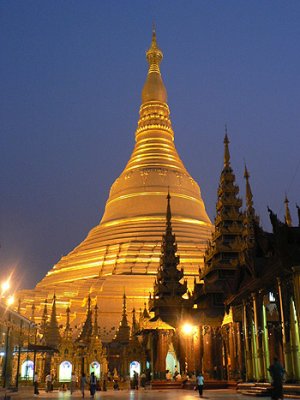
In researching for her PhD thesis, The University of Queensland’s Dr Jessica Harriden battled gender inequity and military rule in Burma (Myanmar), but now her war is won.
The School of History, Philosophy, Religion, and Classics student last week graduated with a PhD, having researched “Women and power in Burmese history”.
“Burma is a fascinating country with astounding natural beauty, religious architecture and cultural diversity” Dr Harriden said.
Her potentially controversial research faced obstacles in military-ruled Burma, where the male leadership is threatened by the popularity of detained opposition leader Aung San Suu Kyi and the efforts of expatriate Burmese women’s organisations to promote increased gender equality.
“As well as learning Burmese, I had to negotiate with Burmese authorities in order to access archival materials and ensure that the identities of the women and men I interviewed were protected,” Dr Harriden said.
Despite these challenges, she said conducting research in Burma was a truly rewarding experience.
“Whether I was trawling through secondhand bookstalls in downtown Rangoon (Yangon), wandering among the thousands of Buddhist temples at Pagan, or trekking through remote villages in upper Burma, the Burmese people were incredibly welcoming and generous in sharing their knowledge and experiences with me, often inviting me into their homes to share a meal, a book or a story” Dr Harriden said.
“By receiving an Australian Postgraduate Award (APA) and a Graduate School Research Travel Award (GSRTA), I was able to travel to Burma, Thailand and London to undertake archival research and conduct interviews.
“Completing my PhD has been an immensely rewarding experience – intellectually, professionally and personally.”
Dr Harriden said without the guidance and support of her supervisors, Emeritus Professor Martin Stuart-Fox, Professor Robert Cribb and Professor Bob Elson, she would never have started – let alone finished – her PhD.
“My supervisors helped me to explore new ideas and refine my arguments, provided invaluable insights and comments on my work, and encouraged me to present and publish my work,” she said.
“My research has not only allowed me to develop a deeper understanding of Burmese history, it has also deepened my understanding of how power relations and gender relations operate in contemporary Burmese society – and in other societies, including my own.
“I wish to continue my involvement in Burma-related research and I hope to build on this knowledge by undertaking further research and collaborating with other researchers (academics, policy makers and NGOs) to enhance our collective understanding of these issues.”
Dr Harriden became fascinated by Burmese history in the last semester of her undergraduate Arts degree and completed her honours thesis on the history of Karen nationalism.
Media: Dr Harriden (0405 843 436) or Dania Lawrence (07 3346 7898).
.jpg)



